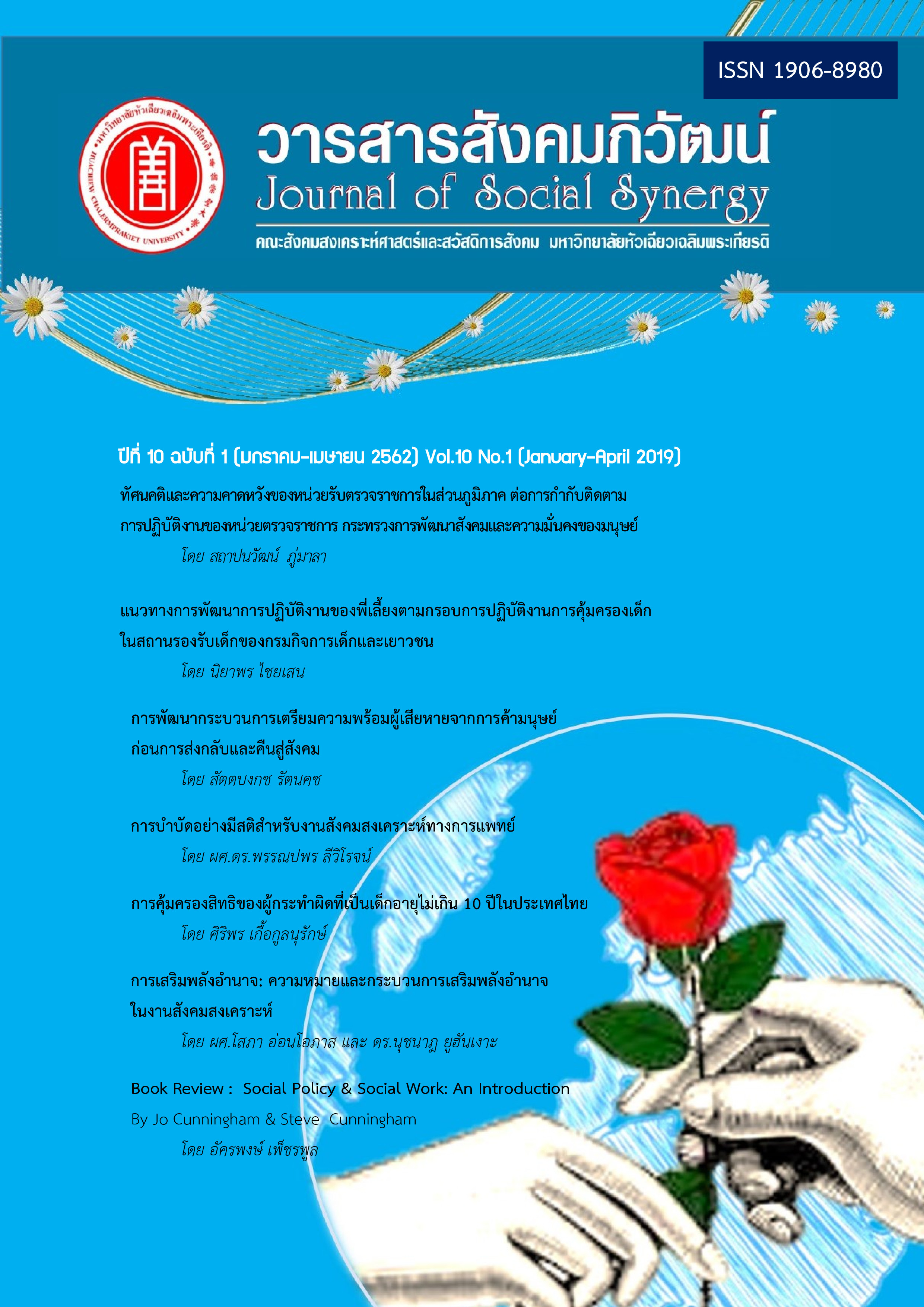Development of victim preparing procedures from human trafficking before returning to society
Keywords:
procedures preparing victim, human trafficking, repatriation and return citizen into the societyAbstract
The objectives of this research are to explore victim preparing procedures from human trafficking before returning to society. Additionally, problem and barriers of victim preparing procedures from human trafficking before returning to society were also examined. Furthermore, this research investigates the developing guideline of victim preparing procedures from human trafficking by using qualitative research methodology.
The study found that the organizations providing protection services to human trafficking victims implement some operational roles as follows: 1) to prepare victims orientation, 2) to interview for finding the data and analyzing the problem, 3) to examine physical health, mental health, social, and intelligence, 4) to give legal assistance, 5) to prepare victims before returning to society, 6) to return victims to society, and 7) to monitor and evaluate the result. However, the processes of victim preparing procedures from human trafficking before returning to society were operated in the form of multidisciplinary teams, both inside and outside the organization by Welfare protection center and reception home. Staffs who provide assistance to victims refer to foreign victim cases. 1) to send the victim's information to the central organization in order to send information to the country of origin to investigate his/ her family; 2) to inquire legal information; 3) to create preparing activities such as relevant laws both Thailand and country of origin, life skills education, having income and career. It is in the form of short-term and long-term training, including evaluating the physical and mental readiness. And 4) to return the victims and follow-up in the form of state to state through bilateral meeting. For Thai victim cases, they will be sent to an organization where the victims are reside in order to visit the family before return. For Thai children cases, parents will pick up the children by themselves. For Thai adults who can go back home by themselves, the organization will then support some traveling expenses to return his/ her domicile. It also includes any other legal money that the victims can obtain legally. The problem, obstacles, and limitations of preparing procedures are communication since it lacks of interpreters. Most importantly, some staffs lack legal knowledge of the countries of origin and have insufficient understanding in the form of activities preparation.
Recommendations for developing preparing procedures: Training seminars and learning exchange need to be held for staffs to promote skills and capability about pre-return preparedness. Furthermore, it is necessary to encourage staffs to communicate in foreign languages such as English, Burmese, and Cambodian. The oversea field trip at the country of origin might be beneficial for staffs to recognize social context and law of each country, including the processes of entering and leaving the border area. Additionally, it should be supported by central administration. Promoting media of human trafficking and creating handbook or curriculum for victim preparation before returning to society which will effectively develop the preparing procedures with the same standards. Training workshop for the staffs which promote online media literacy can help them to design activities to suit with current human trafficking situations, including creating activities to properly suit to particular groups of children.
References
กระทรวงการพัฒนาสังคมและความมั่นคงของมนุษย์. (2553). รวมกฏหมายในภารกิจกระทรวงการ
พัฒนาสังคมและความมั่นคงของมนุษย์ (พิมพ์ครั้งที่ 1). กรุงเทพฯ: สำนักพิมพ์คณะรัฐมนตรี และราชกิจจานุเบกษา.
กระทรวงการพัฒนาสังคมและความมั่นคงของมนุษย์. (2557). คู่มือสำหรับเจ้าหน้าที่ในการปฏิบัติงานป้องกันและปราบปรามการค้ามนุษย์ (พิมพ์ครั้งที่ 1). กรุงเทพฯ: โรงพิมพ์สำนักงานพระพุทธศาสนาแห่งชาติ.
กระทรวงการพัฒนาสังคมและความมั่นคงของมนุษย์ สำนักงานเลขานุการคณะกรรมการป้องกันและปราบปรามการค้ามนุษย์. (2560). รายงานผลการดำเนินงานป้องกันและปราบปรามการค้ามนุษย์ของประเทศ. กรุงเทพฯ: กระทรวงการพัฒนาสังคมและความมั่นคงของมนุษย์.
เล็ก สมบัติ และคณะ. (2557). งานวิจัย “กลไกความร่วมมือระหว่างประเทศในภูมิภาคอาเซียน เพื่อสนับสนุนงานต่อต้านการค้ามนุษย์และแนวทางการพัฒนาระบบการช่วยเหลือคุ้มครองพิเศษแก่ผู้เสียหายจากการค้ามนุษย์” กรมพัฒนาสังคมและสวัสดิการ. กรุงเทพฯ: เจปริ้นท์ 2.
วรชยา ชัยยอง. (2549). การพัฒนาการปฏิบัติงานตามรูปแบบศูนย์การเรียนรู้เพื่อช่วยเหลือและคุ้มครองและเด็กที่ตกเป็นเหยื่อการค้ามนุษย์ของบุคลากรสถานคุ้มครองและพัฒนาอาชีพบ้านเกร็ดตระการ (สารนิพนธ์ปริญญามหาบัณฑิต). กรุงเทพฯ: มหาวิทยาลัยธรรมศาสตร์.
วรรษมน ลูกบัว. (2554). การเตรียมความพร้อมผู้เสียหายจากการค้ามนุษย์สัญชาติลาวก่อนการส่งกลับละคืนสู่สังคม เพื่อป้องกันการตกเป็นเหยื่อซ้ำ (สารนิพนธ์ปริญญามหาบัณฑิต). กรุงเทพฯ: มหาวิทยาลัยธรรมศาสตร์.
Downloads
Published
How to Cite
Issue
Section
License
บทความที่ได้รับการตีพิมพ์เป็นลิขสิทธิ์ของวารสารสังคมภิวัฒน์ มหาวิทยาลัยหัวเฉียวเฉลิมพระเกียรติ
ข้อความที่ปรากฏในบทความแต่ละเรื่องในวารสารวิชาการเล่มนี้เป็นความคิดเห็นส่วนตัวของผู้เขียนแต่ละท่านไม่เกี่ยวข้องกับมหาวิทยาลัยหัวเฉียวเฉลิมพระเกียรติ และคณาจารย์ท่านอื่นๆในมหาวิทยาลัยฯ แต่อย่างใด ความรับผิดชอบองค์ประกอบทั้งหมดของบทความแต่ละเรื่องเป็นของผู้เขียนแต่ละท่าน หากมีความผิดพลาดใดๆ ผู้เขียนแต่ละท่านจะรับผิดชอบบทความของตนเองแต่ผู้เดียว




